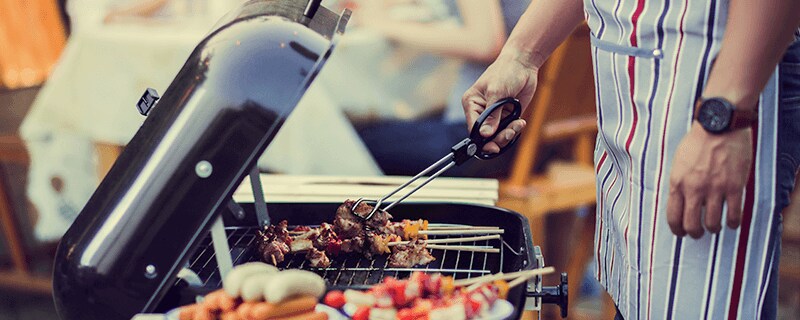Let’s start with acknowledging the fact that high-heat grilling may increase certain health risks. In fact, all high-heat, long-lasting methods of cooking may pose some level of risk due to the compounds that are formed when foods are cooked this way. Here are a few important things to keep in mind when grilling, along with some helpful tips to reduce risk.
The background science and research:
High-fat, high-protein foods form a few potentially dangerous compounds when exposed to high heat for a long period of time.
- AGEs (Advanced Glycation End Products) are produced when sugars present in foods react with other compounds. Blood levels of AGEs have been connected loosely to the presence of Type 2 diabetes. However, there isn’t enough evidence about how AGEs directly impact disease risk to be able to set a threshold of safety (i.e. a certain amount of AGEs in foods or in the blood = a specific health risk).
- HCAs and PAHs (Heterocyclic Amines and Polycyclic Aromatic Hydrocarbons) are compounds formed from the heating of fats and proteins, as well as from the combustion (burning) of materials related to grilling. These compounds can cause changes in DNA, which may increase the risk of developing certain types of cancer.
What to do now:
Even though grilling increases the formation of not-so-nice compounds, the level of this formation can very easily be altered with a few key adjustments.
- Switch up what you’re grilling. Meats that contain less fat won’t be as prone to forming concerning compounds, so that’s a great place to start. To go a step further, flex your grilling muscles on fruits and veggies, which form almost no concerning compounds since they contain such little protein and fat. Plus, fruits and veggies are loaded with antioxidants, which counteract the negative impacts of HCAs and PAHs.
- Use a marinade; and use it correctly. Food science studies have shown that marinating meats in an acidic liquid (i.e. citrus or vinegar) for 60 minutes dramatically reduces the formation of potentially carcinogenic compounds. If fat is used in the marinade, make sure to fully drain since fat dripping onto direct flame causes PAH formation.
- Monitor temperature and time to avoid charring. The higher the heat and the longer the cooking time, the more likely it is that potentially carcinogenic compounds will be formed. Avoid deep charring and do whatever you can to keep food from touching the actual flame.
- Invite herbs to the BBQ. Using fresh herbs in grilling can prevent the formation of HCAs. Leverage the protective antioxidant qualities of fresh herbs, keeping in mind that you’ll want to gravitate towards varieties that can handle heat, such as rosemary, thyme and fennel.
- Build your flame with safer grilling in mind. When researchers looked at the levels of PAHs in grilled foods, those cooked with charcoal, especially when lighter fluid was used, had the highest levels. Ideally, use electric heat, plain charcoal or wood to minimize the formation of PAHs.
Grilling can bring unparalleled flavor to a wide range of nutrient-rich foods. Just like you may decide to add a splash of pure sugar to your coffee or a pat of butter to your toast, a healthy diet is all about balancing flavors you love with healthy choices.
Explore more healthy living advice from our team of experts.
Disclaimer: This information is educational only and not providing healthcare recommendations. Please see a healthcare provider.

